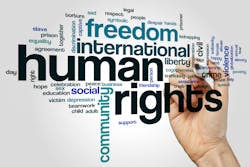The need to implement a stand-alone human rights policy is becoming necessary due to growing environmental, social, and governance (ESG) expectations and expanding global regulation, according to Gartner, Inc.
Human rights concerns within the supply chain are under closer public scrutiny. Furthermore, laws such as the European Union’s Corporate Sustainability Reporting Directive require subject companies to report social issues (including human rights) in their own workforce, value chain, affected communities, customers, and end users.
“A dedicated human rights policy not only allows organizations to lay out comprehensive standards in response to expectations from ESG stakeholders and regulators, but also makes it easier for employees, suppliers, and other partners in the value chain to comprehend and comply with the guidance,” said Dian Zhang, senior research principal with Gartner's Legal, Risk & Compliance practice, in a statement. “In addition, the existence of a stand-alone human rights policy is one of the positive factors that several environment, social, and governance (ESG) rating firms consider when scoring a company’s ESG maturity.”
Seven Questions to Determine if An Organization Needs a Human Rights Policy
To determine if a company needs a human rights policy, Gartner advises using the following questions in working with chief compliance and ethics officers as well as stakeholders.
1. Does a stand-alone human rights policy fit into our corporate and ESG strategy?
2. Does our industry, geography, and/or business model pose a considerable risk of human rights abuses in the value chain?
3. Are our investors asking how we manage human rights issues? Are they inquiring about the existence of any related policies?
4. Are our customers and/or employees asking us to articulate our commitment in this space?
5. Do our suppliers and/or other third-party partners have questions about our expectations of them?
6. Has an ESG evaluator asked us about the existence of a stand-alone policy?
7. Are we subject to any regulations that require the existence of a stand-alone human rights policy?
Compliance and ethics officers should gather answers in material areas from a variety of functions and teams. The more people who answer “yes,” to these questions, the more likely it is that an organization needs human rights policy.
The best human rights policies are clear, transparent, and enforceable and include the three following practices:
Feature Broader Topics and Supporting Documents
Effective human rights policies include workplace civility topics including anti-harassment, anti-discrimination, diversity and inclusion, safety and anti-violence. Addressing labor standards is also important, which can include prohibitions on human trafficking, forced labor, unsafe or unsanitary work conditions, guidance on work hours, prohibitions on child labor, fair wage and overtime practices, and benefits standards.
These rules should apply both inside and outside of an organization, including employees, contractors, suppliers, third-party partners, and customers. Progressive organizations show how their policy works in tandem with relevant guidelines such as the codes of conduct and existing policies on anti-retaliation, workplace civility, and whistleblower protection. They also share supporting documents such as ESG reports or dedicated human rights disclosures and highlight company engagement and membership in relevant international groups and coalitions.
Spell Out Industry-Specific Challenges
Companies should consider incorporating industry-specific issues. This may, for example, cover data protection practices that specify how a company plans to balance privacy protection with government surveillance activities. Organizations that work with indigenous communities may want to create a dedicated policy about global community relations and rights of indigenous peoples. For food and beverage companies, land rights and water resources may be another aspect of human rights to highlight, as it is critical to bringing their products to market.
Share How to Uphold and Enforce the Policy
Leading companies are proactive in how they follow through on their human rights policies. These policies should detail the responsibilities of the board, CEO, ESG steering committee, and/or other internal ESG team related to maintain governance. Another way to show enforcement is to share the methods of supplier audits and their results. It is also paramount to implement a program designed to engage, assess, and audit suppliers.
